|
|
|
Sort Order |
|
|
|
Items / Page
|
|
|
|
|
|
|
| Srl | Item |
| 1 |
ID:
086657
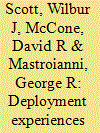

|
|
|
|
|
| Publication |
2009.
|
| Summary/Abstract |
William Lind has argued that the U.S. military is improperly configured and trained to fight "fourth-generation" wars, that is, ones in which one of the participants is a nonstate actor and where the strategy, tactics, and battlefield are unconventional. This position has slowly gained acceptance among U.S. Army and Marine commanders, who have struggled to adapt to fourth-generation realities on the ground in Iraq. Drawing on oral-history and focus-group interviews, the authors explore how two units from Ft. Carson, Colorado, have experienced and adjusted to these contingencies. They offer the SAPRR Model as an illustration of their cognitive approach and a plausible combat script for rapid but considered decision making.
|
|
|
|
|
|
|
|
|
|
|
|
|
|
|
|
| 2 |
ID:
147965
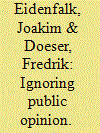

|
|
|
|
|
| Summary/Abstract |
This article investigates why the governments of Australia and Poland decided to contribute military forces to the United States led invasion of Iraq in March 2003 when a majority of Australian and Polish citizens were opposed to national involvement in the invasion. The objective of the article is to increase understanding of the conditions under which governments ignore the public in their foreign policymaking. The article examines the explanatory power of four intervening variables: issue salience, elite debate, timing of the next election and the importance assigned to international gains by the government. On the basis of the Direct Method of Agreement, the article concludes that government perceptions of international gains and the timing of the next election were potentially necessary factors for the outcomes of the cases, while issue salience and elite debate were not necessary conditions. A distant election may, thus, provide sufficient electoral protection for a government that conducts a foreign policy to which the public is opposed.
|
|
|
|
|
|
|
|
|
|
|
|
|
|
|
|
| 3 |
ID:
138564
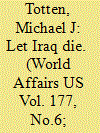

|
|
|
|
|
| Summary/Abstract |
The Kurds in the north, who make up roughly twenty percent of the population, want out. They never wished to be part of Iraq in the first place. To this day, they still call the bathroom the “Winston Churchill,” in sarcastic homage to the former British prime minister who shackled them to Baghdad. Since the early 1990s, they’ve had their own government and autonomous region in the northern three provinces, and they held a referendum in 2005 in which 98.7 percent voted to secede and declare independence. The only reason they haven’t finally pulled the trigger is because it hasn’t been safe; the Turks—who fear the contagion of Kurdish independence inside their own country—have threatened to invade if they did.
|
|
|
|
|
|
|
|
|
|
|
|
|
|
|
|
| 4 |
ID:
075208


|
|
|
|
|
| Publication |
Cambridge, Polity Press, 2006.
|
| Description |
xiii, 231p.
|
| Contents |
Second edition
|
| Standard Number |
0745638635
|
|
|
|
|
|
|
|
|
|
|
|
Copies: C:1/I:0,R:0,Q:0
Circulation
| Accession# | Call# | Current Location | Status | Policy | Location |
| 051993 | 355.02/KAL 051993 | Main | On Shelf | General | |
|
|
|
|
| 5 |
ID:
161629
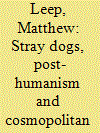

|
|
|
|
|
| Summary/Abstract |
International Relations scholars have recently begun exploring the politics of human-animal relations in global affairs. Building on Jacques Derrida’s work on hospitality and animals, this article theorises possibilities of responsibility to animals in war zones, pushing the limits of what it means to be with and for others regardless of their human or animal otherness. Specifically, I develop a critical account of cosmopolitan belongingness to illustrate how our being on earth is always a ‘being-with’ animal others. In thinking through possibilities of post-human belongingness that could emerge in times of war, cosmopolitanism becomes a futural task, an out-of-time and endless confrontation of past and future opportunities for interspecies togetherness. The theoretical significance of this approach is illustrated with a case study on the killing of stray dogs during the Iraq War. This case reveals a cosmopolitanism calibrated to more fully consider possibilities of human-animal belongingness amidst violence.
|
|
|
|
|
|
|
|
|
|
|
|
|
|
|
|
| 6 |
ID:
109144
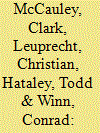

|
|
|
|
|
| Publication |
2011.
|
| Summary/Abstract |
A 2008 poll of 430 Ottawa Muslims found predominantly negative views of the U.S. war on terrorism, including the war in Iraq and the war in Afghanistan. This poll also assessed approval of Western powers (U.S., Canada, Israel, United Nations) and challengers of Western power (Al-Qaeda, Hamas, Hizballah, government of Iran). Surprisingly, attitudes of Ottawa Muslims toward militant Muslim groups were unrelated to their attitudes toward Western governments. Discussion suggests that this pattern, if confirmed in other Muslim polls, would mean that the war of ideas against radical Islam must address not one target but two: favorable opinions of militants and unfavorable opinions of the U.S. Muslims who come to like the West more may not like Muslim militants any less.
|
|
|
|
|
|
|
|
|
|
|
|
|
|
|
|
| 7 |
ID:
141847


|
|
|
|
|
| Summary/Abstract |
This paper argues that the effects of war as a performance issue in elections are different for a right-wing than a left-wing leader. War is consistent with the reputation of right-wing, hawkish governments, but does not fit the reputation of left-wing, dovish governments, and necessitates a turn away from the domestic issues the public expects left-wing governments to prioritize. War therefore varies in its effects on perceptions of right-wing and left-wing leaders. War also provides more temptation for left-wing supporters to defect to the incumbent under a right-wing government than for right-wing supporters to defect under a left-wing government. The War in Iraq and elections in the United States and UK provide a unique case to test these arguments. The results confirm that Blair paid a higher political price as a left-wing leader, because perceptions of Blair's trustworthiness became central to evaluations of him. Conversely, positive perceptions of strength became central to evaluations of Bush as a right-wing leader. The war also had asymmetric effects on supporters of the opposition party in the UK that resulted in higher costs to Blair. These findings imply that the risks of going to war are greater for left-wing leaders.
|
|
|
|
|
|
|
|
|
|
|
|
|
|
|
|
|
|
|
|
|